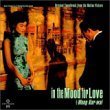[23] In the Mood for Love directed by Wong Kar Wai
 In the Mood for Love is such a charm despite a very simple plot. The year was 1962. Chow Mo Wan, a newspaper editor, recently moved into a dwelling populated by Shanghai immigrants with his wife. Through casual and accidental encounters Chow exchanged pleasantry with So Lai Jun (Mrs. Chan) who later found out about her husband's affair with Chow's wife. Heartbroken and devastated of the cruel truth, Chow buried himself in his job while So indulged in nightly movie screening. They began to let down the guard for one another and spent time during the mahjong sessions of their landlords. The characters forced themselves to abide by inveterate conventions and cultural morale that forbid an affair to become fruition.
In the Mood for Love is such a charm despite a very simple plot. The year was 1962. Chow Mo Wan, a newspaper editor, recently moved into a dwelling populated by Shanghai immigrants with his wife. Through casual and accidental encounters Chow exchanged pleasantry with So Lai Jun (Mrs. Chan) who later found out about her husband's affair with Chow's wife. Heartbroken and devastated of the cruel truth, Chow buried himself in his job while So indulged in nightly movie screening. They began to let down the guard for one another and spent time during the mahjong sessions of their landlords. The characters forced themselves to abide by inveterate conventions and cultural morale that forbid an affair to become fruition.Tony Leung and Maggie Cheung as usual deliver an impeccable performance in this 2001 Wong Kar-Wai release. Leung portraited a man who is unsatisfied about his marriage and denied his spouse's infidelity. Cheung seizes the empathy of her character who is accustomed to hush about reason for his husband's frequent absence. Maggie Cheung is elegant and charming in this movie. Not to mention the dazzling wardrobe she wears consistently over the entire movie. Her leg movements are captured in slow motion. Her arms dangling with the thermos meant for the late-night porridge order-to-go from the street vendor.
The movie is shot through a minimalist scope, that is, message is conveyed through very succinct scripts and imagery full of lush colors and meticulously chosen soundtracks. The film is shot in a very stealthy manner; it is as if a pin camera being fastened on the wall of the apartment. Conversations between Leung and Cheung are shot in an eavesdropping manner. The director seeks to de-emphasize other characters in order to focus on Leung and Cheung. Their spouse, respectively, always have their back facing the camera. Their performances are conducted by voices. The gaffer has done an excellent job adjusting the hues of light which is relatively dim throughout.
As a native of Hong Kong (born in mid-70s) who never witnessed the city in glory 60s, In the Move for Love has done me a favor in reminiscence. Wong Kar Wai makes sure everything is done just like when it was the 60s. Yes, even the restaurant menu to which Leung and Cheung skimmed through briefly. It was a green piece of cardboard decorated with some coconut tree clip art. Menu with such heavy Malaysian touch can still be found at local cafés that serve a fusion menu of Malaysian spices and sirloin steaks. Napkins are folded diamond-shaped like paper planes and kept at the far end of the booth. Leung and Cheung sip coffee from flimsy green chinaware cups that hold maybe three gulps. The green vinyl blinds hang unevenly at the office windows. The rotary phone. The subleased rooms where newly-wed couples rent and the kitchen with whom they share with their landlords. The white-collared wardrobe worn by housemaids. These are all the epitomes of lives in the 60s, in Hong Kong. Some find this mmovie a little slow-paced. I savor the manner in which the film is made. I savor all the details, the choice of colors and the tiptoeing scores in the film.
2 Comments:
This is one of the most beatiful movies made, and I'm sorry that I haven't yet caught the sequel, 2046.
Cinematography is incontentibly fabulous but the story of 2046 is somewhat disjointed. That's all I'm gonna say if you haven't watched it.
Post a Comment
<< Home